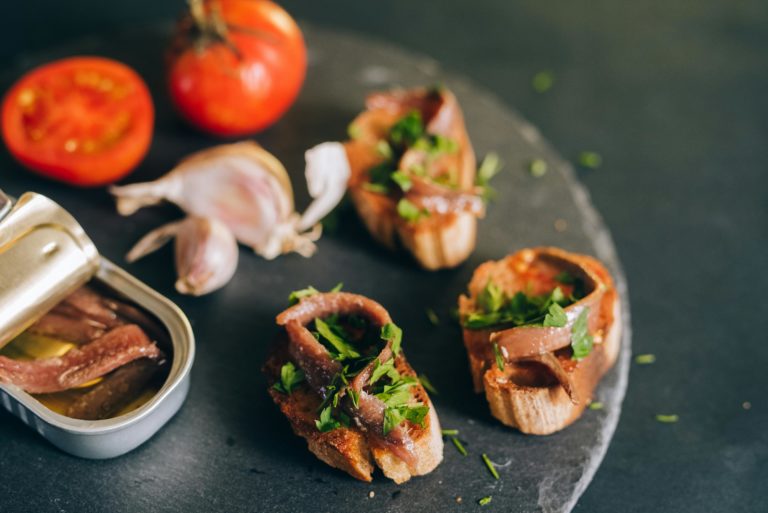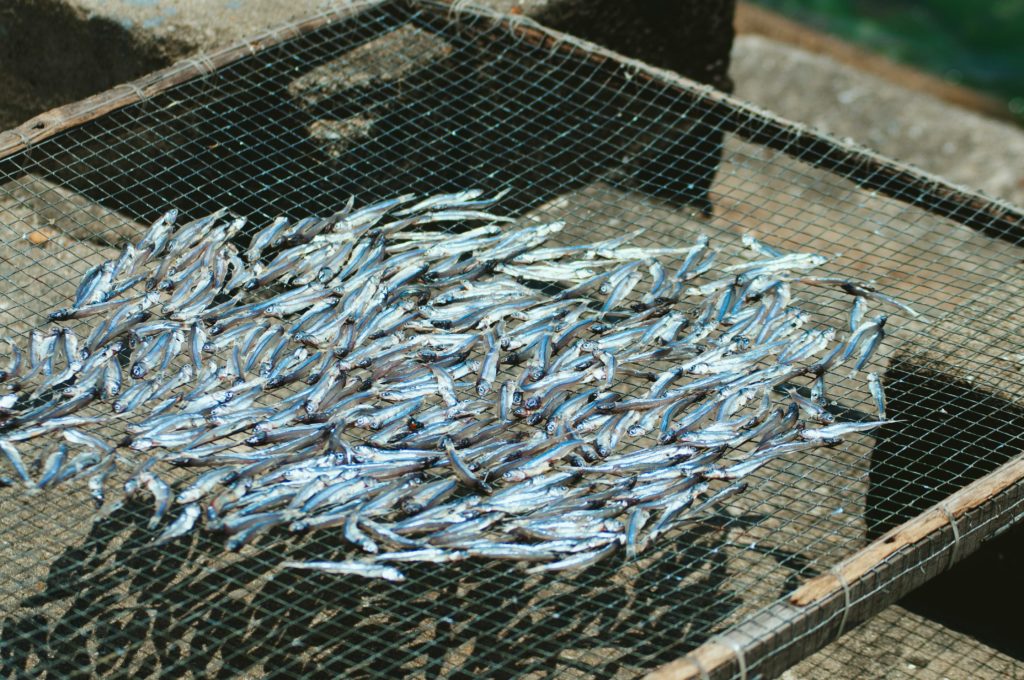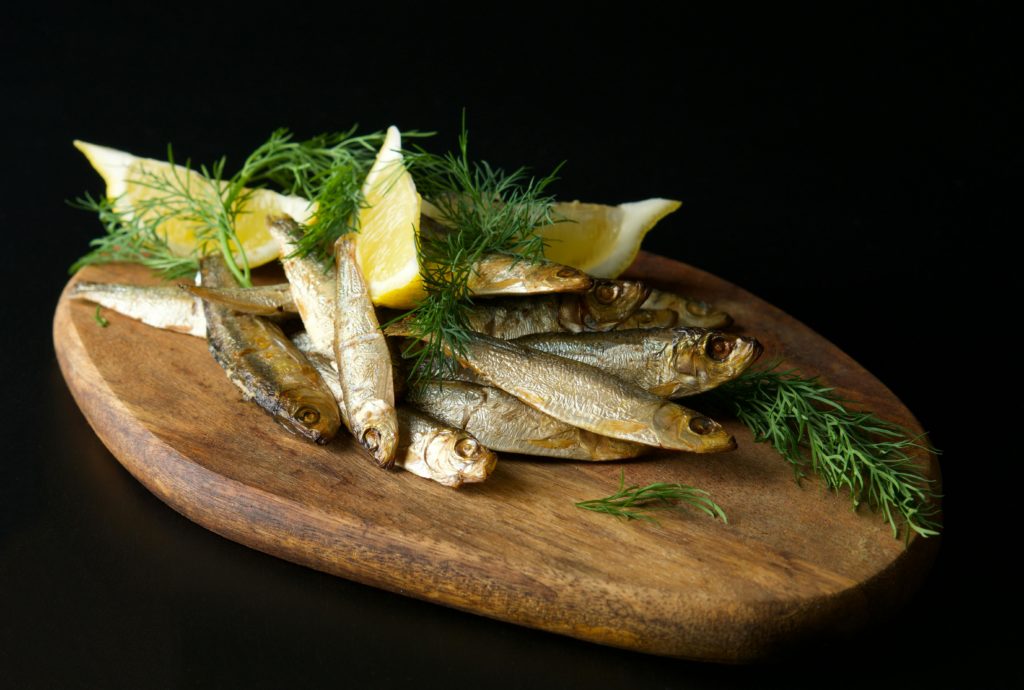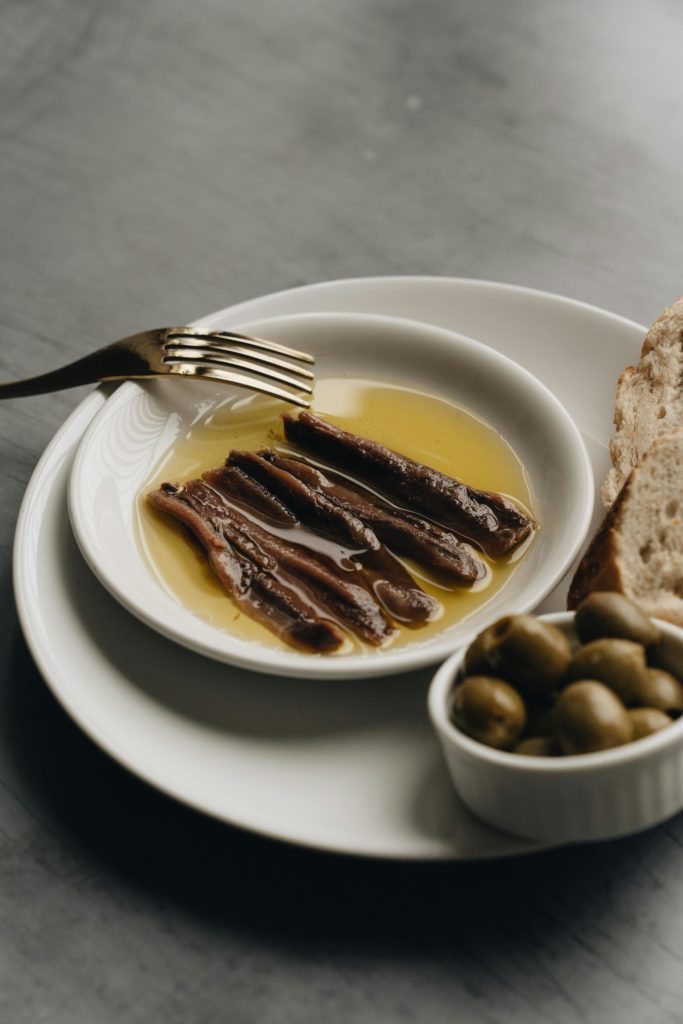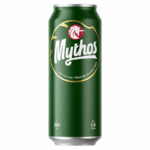Greek anchovies: A delicacy from the Aegean Sea
Greek anchovies, or “gavros”, are a culinary treasure from the crystal-clear waters of the Aegean Sea. These small fish, with their tender, flavorful flesh, are caught using sustainable practices. Their unique flavor comes from a perfect combination of the marine environment and know-how handed down from generation to generation.
Versatile in the kitchen, these fish can be incorporated into a variety of Mediterranean dishes. Their richness in omega-3 and essential nutrients also makes them a healthy choice. Their distinct taste, deeply rooted in the Greek tradition, will appeal to food lovers and gourmets alike.
The History of Anchovy Fishing in Greece: A Centuries-old Tradition
Anchovy fishing in Greece is part of a thousand-year-old tradition dating back to antiquity. The ancient Greeks appreciated these small fish for their taste and nutritional benefits. Fishermen of the time were already adopting techniques adapted to the rich waters of the Aegean Sea.
Over the centuries, this practice has been perpetuated in harmony with nature. Handcrafted methods handed down through the generations preserve marine ecosystems. Today, Greek fishermen are adopting sustainable practices to protect biodiversity and ensure the long-term future of marine resources.
The Different Methods of Preparing Greek Anchovies
Grilled or fried anchovies: the simplicity of natural taste
Fresh Greek anchovies can be enjoyed grilled or fried, often served as a mezze or main course. These simple preparations exalt their natural taste and tender texture, offering an authentic experience of Greek cuisine.
Gavros Marinatos: Traditionally marinated anchovies
The marinated anchovies follow the traditional “gavros marinatos” method. Fish are immersed in a brine of salt and vinegar, then garnished with oregano, bay leaves or garlic. This technique not only enhances the flavors, but also preserves the anchovies for prolonged consumption.
Anchovies preserved in olive oil: a meltingly sweet taste
Preserved in olive oil, one of Greece’s star products, anchovies take on a melt-in-the-mouth texture and a delicately sweet taste. This preparation extends their shelf life and makes them perfect for salads, spreads or mezze.
Regional Variations: Locally Spiced and Pickled Anchovies
In some regions of Greece, anchovies are enriched with local spices or marinades, creating unique variations of this specialty. These regional recipes bear witness to the richness of Greek cuisine and the preservation of age-old traditions.
Anchovies in Greek Cuisine: A Versatile Ingredient
Greek anchovies enhance a wide variety of recipes, combining Mediterranean traditions with modern inspiration. Their savory flavor adds a unique, refined touch to every dish.
In the famous “salata horiatiki” (Greek salad), anchovies balance crisp vegetables, creamy feta and fruity olive oil. As an appetizer, serve them marinated with fresh bread, olives and a touch of lemon for a simple, tasty aperitif.
Psarosoupa”, Greek fish soups, use anchovies to enrich the broth with delicate marine notes. In “pites”, Greek savoury tarts, they enhance vegetable or herb fillings, adding an inimitable depth.
As a pasta accompaniment, Greek anchovies blend perfectly with garlic, fresh herbs and olive oil. They create simple dishes full of character, perfect for fast, balanced cooking.
As an aperitif, they seduce with their simplicity. Serve with fresh parsley, toasted bread and a squeeze of lemon for an authentic marriage of flavors. Their versatility means they can be used at every stage of a meal, from starter to main course.
Opting for Greek anchovies means choosing a healthy product from a sustainable fishery, and a symbol of Mediterranean gastronomy. These generous little fish embody the richness of culinary traditions while adding an essential marine touch to your table.
Authentic recipes with Greek anchovies
- Marinated anchovies and fresh vegetables on toast
Spread a layer of fromage frais or tzatziki on a slice of toast.
Arrange marinated anchovies and add slices of tomato and capers for an explosion of flavor.
- Greek Pasta with anchovies
Sauté anchovies in olive oil with garlic, fresh herbs and black olives.
Toss with al dente spaghetti and finish with a drizzle of lemon juice.
These quick and delicious dishes illustrate the versatility of Greek anchovies in everyday cooking.
Food and beverage pairings
Greek anchovies are ideal with dry white wines such as Assyrtiko from Santorini or Moschofilero from the Peloponnese. These wines, with their fruity, mineral notes, balance the saltiness of anchovies and intensify their flavors. For a more daring option, a slightly diluted ouzo adds a touch of aniseed that enhances their marine flavor. Finally, a light Greek craft beer, such as Nissos or Septem, is perfect for refreshing summer aperitifs.
The health benefits of Greek anchovies
Nutrient-rich Greek anchovies are an ideal choice for a healthy, balanced diet.
Their high omega-3 content supports cardiovascular health. These fatty acids reduce cholesterol, prevent heart disease and improve blood circulation. They also help regulate blood pressure, contributing to lasting well-being.
These small fish provide high-quality proteins, essential for strengthening muscles and repairing tissues. They’re also packed with B vitamins for energy metabolism, and minerals like calcium and magnesium for strong bones and healthy teeth.
Unlike other fish, Greek anchovies contain little mercury. This makes them safe for regular consumption, suitable for children and pregnant women.
With their low calorie content and rich nutritional content, they are ideal for those who want to combine flavour with a balanced diet.
Incorporating Greek anchovies into your meals means enjoying a Mediterranean delicacy while taking care of your overall health.
Focus on an Emblematic Region: Halkidiki, Cradle of Greek Anchovies
Halkidiki, famous for its three peninsulas, boasts crystal-clear waters and marine ecosystems rich in biodiversity. These ideal conditions make the region a prime location for artisanal anchovy fishing. Local fishermen, guardians of an age-old tradition, use techniques that respect the environment. Each fishery respects strict quotas, guaranteeing the preservation of marine resources.
Halkidiki anchovies are distinguished by their tender flesh and refined taste. Caught at dawn, they are quickly processed to preserve their exceptional freshness. Renowned producers like Gavros Halkidikis sublimate these fish by transforming them into delicate marinades. They choose local ingredients, such as extra virgin olive oil and Mediterranean herbs, to enhance their flavor.
In local taverns, anchovies are given pride of place in traditional recipes. Fried anchovies, crispy on the outside and melt-in-the-mouth on the inside, appeal to lovers of simple, authentic dishes. Grilled anchovies and herb marinades are another specialty. They are often served with local white wine or tsipouro.
Halkidiki also celebrates its anchovies with marine festivals that attract gourmets and the curious alike. These festive events highlight the gastronomic wealth and heritage of this unique region. To discover Halkidiki anchovies is to immerse yourself in a culture that combines tradition, local flavors and respect for nature.
Sustainable anchovy fishing in Greece
In Greece, anchovy fishing reflects a strong commitment to preserving marine ecosystems and natural resources. Strict regulations, established to protect biodiversity, ensure a balance between exploitation and stock renewal.
Greek fishermen adopt traditional techniques such as seining and pole fishing. These methods target adult anchovy, limiting bycatch and preserving marine habitats. These responsible practices encourage natural reproduction and maintain fish populations.
Fishing periods are regulated to respect spawning cycles. This approach protects resources while ensuring optimum quality of the fish caught. Areas close to ports ensure optimum freshness. Anchovies are quickly transported to markets or canneries.
By choosing Greek anchovies, you’re supporting a local economy that values tradition and respects the environment. This sustainable model combines craftsmanship and conservation. It protects ecosystems while meeting present and future needs.
Regional Differences of Anchovies in Greece
Aegean anchovies (Cyclades and Dodecanese)
Anchovies from the Aegean islands, such as Cyclades and Dodecanese, are distinguished by their tender flesh and delicate flavor. These characteristics make them ideal for light marinades, perfect for a Mediterranean mezze.
Anchovies from the Gulf of Patras
In the Gulf of Patras, anchovies have a firmer texture and a more pronounced flavor. They’re perfect for grilling or cooking, where their unique character can be brought to the fore.
Ionian anchovy (Corfu)
Anchovies from the Ionian islands, especially Corfu, are more robust and blend perfectly with local recipes featuring herbs, spices and olive oil. Their intense flavor enriches the region’s traditional dishes.
Epirus anchovy
The coastal regions of Epirus, influenced by the mountains, prefer anchovies preserved in strongly flavored brine. These preparations, often enriched with bay leaves and oregano, bring intense flavors characteristic of Greek mountain cooking.
Anchovies from Crete
In Crete, anchovies are often marinated with citrus zest, adding a refined touch. This unique method perfectly balances acidity and sweetness, creating a distinctive taste.
How to Distinguish Quality Greek Anchovies
Fresh anchovies: Visual and Sensory Identification
Fresh anchovies should have a bright silvery color and firm flesh. Their fragrance should be subtle, with no unpleasant odors. On the palate, the texture should be soft and smooth, not mushy or dry.
Marinated anchovies: Signs of good preservation
For marinated anchovies, the slightly golden or pink color indicates good keeping qualities. Their flavor must balance salinity and natural aromas. Quality herbs and vinegars enhance their taste with finesse. Artisanal marinades favor harmonious tastes without artificial or excessive notes.
Anchovies in Olive Oil: Quality Inspection
Anchovies preserved in olive oil also require careful inspection. The oil used must be clear, of superior quality, and preserve the flavor of the fish without masking it. The pieces should be fully immersed, with a melting yet firm texture, the sign of a well-worked product.
Focus on local, quality products
Choose anchovies with labels or geographical indications. Also choose those from small fisheries or local producers. Glass jars or transparent packaging provide a convenient visual check, ensuring an informed and satisfying purchase.
The Economic Impact of Anchovies in Greece
Greek anchovies support the economy of coastal regions, from islands to fishing villages. This sector employs thousands of fishermen, craftsmen and shopkeepers, perpetuating age-old traditions. Small family businesses, essential to this activity, depend on anchovies to preserve their way of life and heritage.
By consuming these products, you are supporting a sustainable local economy and promoting know-how handed down from generation to generation. International markets, seduced by their quality, are boosting this sector by increasing demand for Greek anchovies. These exports enhance the reputation of Mediterranean gastronomy and highlight Greek excellence.
Marine festivals, held in various regions, celebrate the importance of anchovies to the local economy and culture. These events attract visitors, generating tourism revenue while honoring Greece’s maritime and culinary traditions. These events prove that Greek anchovies are much more than just a product. They proudly symbolize our national heritage.


